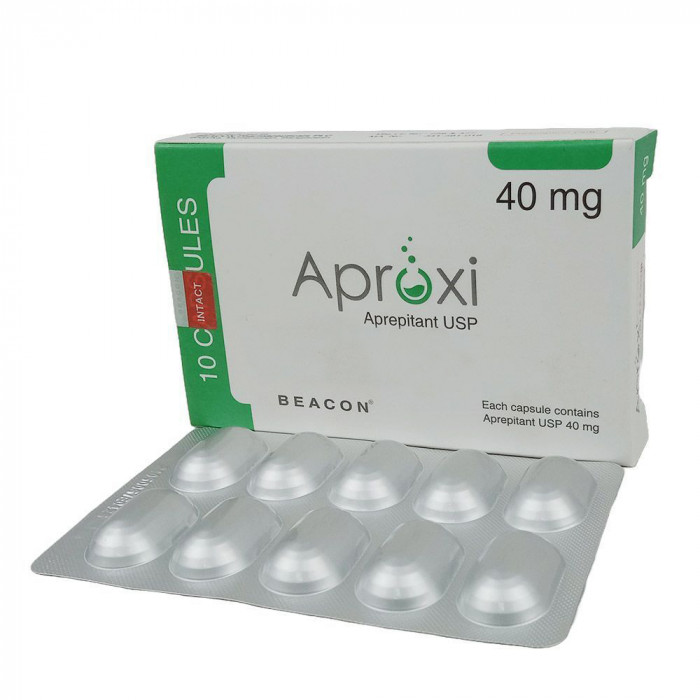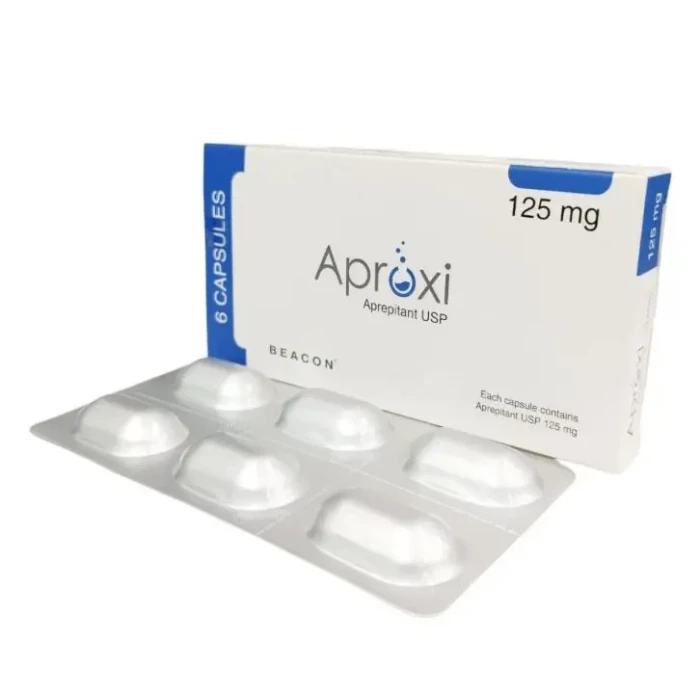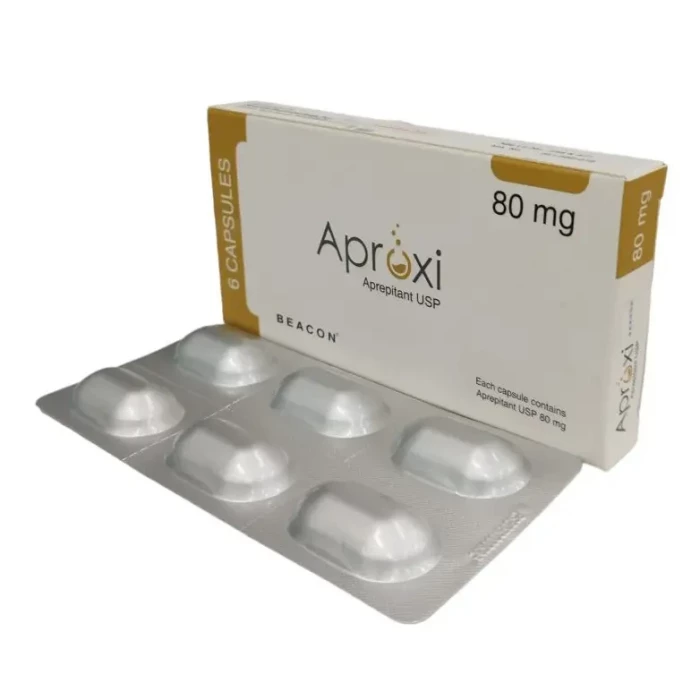
✔ 100% Authentic Product
👁️ Currently Viewing 2149
Aproxi 40mg Capsule 1 Strip
Aproxi 40 treats nausea and vomiting caused by chemotherapy. Aproxi 40 prevents vomiting by blocking cytotoxic chemotherapeutic agents. It does that by requisitioning brain NK1 receptors. It enhances the antiemetic activity of 5-HT3-receptor antagonist ondansetron and the corticosteroid reason.
Discount
Price: ৳ 490
MRP:
৳
500
2%
Off

100% Genuine Products, Guaranteed

Safe & Secure Payments, Always

Fast, Secure & Efficient Delivery

Proper Packaging
 Cash on Delivery - All over Bangladesh
Cash on Delivery - All over Bangladesh Regular Delivery - 12-24 Hours, Dhaka City* Charge Tk.39-59
Regular Delivery - 12-24 Hours, Dhaka City* Charge Tk.39-59 Regular Delivery - 24-48 Hours, Other Cities* Charge Tk.99-110
Regular Delivery - 24-48 Hours, Other Cities* Charge Tk.99-110
 ফ্রি ডেলিভারিঃ - ৯৯৯ টাকা+ অর্ডারে, ঢাকা
শহরে
ফ্রি ডেলিভারিঃ - ৯৯৯ টাকা+ অর্ডারে, ঢাকা
শহরে ফ্রি ডেলিভারিঃ - ২৯৯৯ টাকা+ অর্ডারে, ঢাকার
বাহিরে
ফ্রি ডেলিভারিঃ - ২৯৯৯ টাকা+ অর্ডারে, ঢাকার
বাহিরে
100% Genuine Products, Guaranteed
Safe & Secure Payments, Always
Fast, Secure & Efficient Delivery
Proper Packaging
 Cash on Delivery - All over Bangladesh
Cash on Delivery - All over Bangladesh Regular Delivery - 12-24 Hours, Dhaka City* Charge Tk.39-59
Regular Delivery - 12-24 Hours, Dhaka City* Charge Tk.39-59 Regular Delivery - 24-48 Hours, Other Cities* Charge Tk.99-110
Regular Delivery - 24-48 Hours, Other Cities* Charge Tk.99-110 ফ্রি ডেলিভারিঃ - ৯৯৯ টাকা+ অর্ডারে, ঢাকা
শহরে
ফ্রি ডেলিভারিঃ - ৯৯৯ টাকা+ অর্ডারে, ঢাকা
শহরে ফ্রি ডেলিভারিঃ - ২৯৯৯ টাকা+ অর্ডারে, ঢাকার
বাহিরে
ফ্রি ডেলিভারিঃ - ২৯৯৯ টাকা+ অর্ডারে, ঢাকার
বাহিরে
✅ Description:
Aproxi 40 is classified as an anti-emetic medication. It is prescribed to prevent nausea and vomiting associated with chemotherapy (anti-cancer treatments) in adults and adolescents aged 12 years and older. Nausea refers to a sensation of discomfort in the stomach that often precedes vomiting, which is the involuntary or voluntary expulsion of stomach contents through the mouth.
Aproxi 40 contains Aprepitant, which works by blocking a chemical in the nervous system responsible for triggering vomiting. By doing so, it effectively helps prevent nausea and vomiting.
Aproxi 40 should be taken exactly as directed by your doctor. It is advised to continue taking the medication for the prescribed duration. Some common side effects may include headache, constipation, loss of appetite, fatigue, indigestion, and hiccups. These effects are usually mild and tend to resolve on their own, but if they persist or worsen, consult your doctor.
Before taking this medication, inform your doctor if you have any allergies to Aproxi 40 or other medicines. This medication is not recommended for children under 12 years of age.
Safety Advices

Alcohol
UNSAFE
The safety of consuming alcohol with Aproxi 40 is unknown. Consult your doctor before use.

Pregnancy
CONSULT YOUR DOCTOR
There is no sufficient data on the use of Aproxi 40 during pregnancy. Consult your doctor before taking this medication.

Breastfeeding
CONSULT YOUR DOCTOR
Aproxi 40 may not be safe for use during breastfeeding, as limited human data suggests the drug may pass into breast milk and potentially harm the baby. Consult your doctor for guidance.

Driving
CAUTION
Aproxi 40 may cause drowsiness, dizziness, or vision impairment, affecting alertness. Avoid driving or operating machinery if these symptoms occur.

Kidney
CONSULT YOUR DOCTOR
Aproxi 40 is considered safe for patients with kidney disease, and no dose adjustment is generally required.

Liver
CONSULT YOUR DOCTOR
Limited data suggests Aproxi 40 is likely safe for patients with liver disease, and dose adjustments may not be necessary. However, consult your doctor for personalized advice.
✔️ Uses of Aproxi 40
- Nausea and vomiting due to chemotherapy
✔️ How does Aproxi 40 work?
Aproxi 40 works by blocking certain chemicals in the body that trigger nausea and vomiting. It is commonly used to prevent sickness caused by medications or cancer treatments like chemotherapy and radiation therapy, helping patients recover more comfortably. Additionally, it is effective in preventing nausea and vomiting following surgery (in adults only). For optimal results, take this medication exactly as prescribed by your doctor.
✔️ Side Effects of Aproxi 40
- Headache
- Dyspepsia
- Fatigue
- Increased Liver Enzymes
- Decreased Appetite
- Constipation
✔️ The dosage recommendations for Aprepitant vary depending on its intended use:
Postoperative Nausea and Vomiting:
- A single 40 mg oral dose should be taken within 3 hours before anesthesia induction.
Chemotherapy-Induced Nausea and Vomiting (CINV):
For highly emetogenic chemotherapy:
- Day 1: Aprepitant 125 mg orally, Dexamethasone 12 mg orally, and a 5-HT3 antagonist (e.g., Ondansetron 24 mg) 30 minutes before chemotherapy.
- Day 2: Aprepitant 80 mg orally, Dexamethasone 8 mg orally.
- Day 3: Aprepitant 80 mg orally, Dexamethasone 8 mg orally.
- Day 4: Dexamethasone 8 mg orally (without Aprepitant).
Aprepitant should be taken 1 hour before chemotherapy on Day 1 and in the morning on Days 2 and 3. Dexamethasone should be taken 30 minutes before chemotherapy on Day 1 and in the morning on Days 2 through 4, considering drug interactions.
For moderately emetogenic chemotherapy:
- Day 1: Aprepitant 125 mg orally, Dexamethasone 12 mg orally, and a 5-HT3 antagonist (Ondansetron 8 mg 30 minutes before chemotherapy, followed by another 8 mg dose 8 hours later).
- Day 2 & 3: Aprepitant 80 mg orally and Ondansetron 8 mg twice daily.
✔️ Interaction
Aprepitant should be taken 1 hour before chemotherapy on Day 1 and in the morning on Days 2 and 3. Dexamethasone is administered 30 minutes before chemotherapy on Day 1, with dose adjustments accounting for drug interactions.
✔️ Interaction
- CYP3A4 Inhibitors (e.g., clarithromycin, diltiazem, verapamil, itraconazole, ritonavir, etc.): These drugs may increase Aprepitant levels, potentially intensifying its effects.
- CYP3A4 Inducers (e.g., carbamazepine, phenytoin, rifampicin, primidone, phenobarbital): These may reduce Aprepitant’s efficacy by accelerating its breakdown.
- CYP2C9 Substrates (e.g., phenytoin, tolbutamide, warfarin): Aprepitant may lower their plasma concentrations, affecting their effectiveness.
- Dexamethasone and Methylprednisolone: Aprepitant can increase their plasma levels, necessitating dose adjustments.
- Benzodiazepines (e.g., midazolam, diazepam, alprazolam): Aprepitant may increase their plasma concentrations, leading to prolonged sedation.
- Colchicine: Its serum levels may rise, increasing the risk of toxicity.
- Chemotherapy Drugs (e.g., docetaxel, paclitaxel, vincristine, etoposide, ifosfamide, imatinib): Aprepitant may enhance their toxicity due to CYP3A4 metabolism interference.
- Ergot Derivatives: Increased levels could lead to ergotism, causing severe vasoconstriction.
- Oral Contraceptives: Aprepitant may reduce their effectiveness; alternative contraception is recommended during treatment and for at least one month after the last dose.
- Potentially Fatal Interactions:
- Astemizole, cisapride, pimozide, terfenadine: Increased serum levels may cause life-threatening torsade de pointes arrhythmias.
✔️ Contraindications:
Aprepitant is contraindicated in patients who are hypersensitive to any component of the product. Aprepitant should not be used concurrently with Pimozide, Terfenadine, Astemizole or cisapride.
✔️ Pregnancy & Lactation
Pregnancy Category B. This drug should be used during pregnancy only if clearly needed. It is not known whether this drug is excreted in human milk. A decision should be made whether to discontinue nursing or to discontinue the drug based on the patient’s importance.
✔️ Storage:
Store in a cool and dry place away from sunlight
⚠️Disclaimer:
At ePharma, we’re committed to providing accurate and accessible health information. However, all content is intended for informational purposes only and should not replace medical advice from a qualified physician. Please consult your healthcare provider for personalized guidance. We aim to support, not substitute, the doctor-patient relationship.








